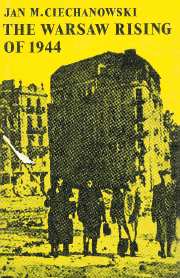Book contents
- Frontmatter
- Contents
- Abbreviations
- Acknowledgements
- Introduction
- Map
- 1 The Big Three and Poland: July 1943–July 1944
- 2 The Genesis of the Polish Resistance Movement
- 3 Attempts to Unify the Polish Resistance Movement
- 4 The Polish Grand Strategy, 1941–1943
- 5 The ‘Tempest’ Plan
- 6 The London Poles and ‘Tempest’
- 7 The ‘Tempest’ East of Warsaw
- 8 The Fate of Warsaw
- 9 Why Warsaw Rose
- 10 Warsaw and the Émigré Leaders
- Conclusions
- Bibliography
- Index
- Frontmatter
- Contents
- Abbreviations
- Acknowledgements
- Introduction
- Map
- 1 The Big Three and Poland: July 1943–July 1944
- 2 The Genesis of the Polish Resistance Movement
- 3 Attempts to Unify the Polish Resistance Movement
- 4 The Polish Grand Strategy, 1941–1943
- 5 The ‘Tempest’ Plan
- 6 The London Poles and ‘Tempest’
- 7 The ‘Tempest’ East of Warsaw
- 8 The Fate of Warsaw
- 9 Why Warsaw Rose
- 10 Warsaw and the Émigré Leaders
- Conclusions
- Bibliography
- Index
Summary
The decision of the Polish leaders to fight in Warsaw was prompted by political, diplomatic, ideological and military considerations. Politically, the insurrection was intended by its authors to achieve four basic objectives. These were, to facilitate the emergence in Warsaw of an administration loyal to the Polish Government in London, to ensure for this administration the highest degree of popular support; conversely, to prevent the Polish Communists and their sympathisers from establishing themselves in Warsaw, with Russian help, as the new leaders of resurgent Poland, and finally to compel Stalin to recognise London Poles as the rightful rulers of Poland. The authors of the insurrection were not prepared to relinquish their ambition to govern Poland without a fight. They identified Poland, her interests and future with themselves.
Diplomatically, the pro-London leaders hoped, by staging a successful anti-German insurrection, to assist Mikolajczyk in his forthcoming negotiations with Stalin and to invite Churchill and Roosevelt to reaffirm their support for the Polish Government in London and its agencies in Poland. However, no serious diplomatic preparations for the insurrection were made by Mikolajczyk even in London and Washington, let alone Moscow.
Idealogically, when making their decision to rise in Warsaw, the authors of the insurrection were guided by the doctrine of two enemies, that is, their belief that while the struggle against the Germans must be continued, political opposition to the Russians and the Polish Communists must be strengthened, and, that help for the restoration of independent Poland must be sought primarily in London and Washington.
- Type
- Chapter
- Information
- The Warsaw Rising of 1944 , pp. 312 - 315Publisher: Cambridge University PressPrint publication year: 1974



